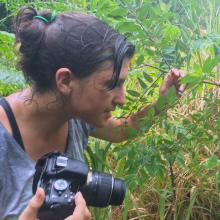A. Saskia Wolsak
Why did you decide to pursue a graduate degree?
Pursuing a PhD is a part of my longer-term life-goal of examining the importance of plant species to cultures worldwide and to finding innovative ways to explore and shed light on the human-nature relationship. Completing my MSc in the Interdisciplinary Studies Graduate Program afforded me the opportunity to ask big questions about the role of human culture in ecological systems, and the role of ecology in cultural evolution; something neither anthropology nor botany alone could have supported. My master's thesis research gave me invaluable skills in the fields of history, botany, and ethnography, as well as the larger lenses of historical ecology and social-ecological systems. It also showed me the subtler values of plant knowledge in a community, such as the storytelling and social bonds associated with engaging in skilled work with others, and the personal and cultural identification people may experience with particular plant species. I was inspired by these insights to pursue a PhD in the same field. Having more time to pursue related research and fieldwork would allow me to go deeper with the insights I gained from my MSc. I feel like this work is timely and needed in the world today, and I have the time, opportunity, and passion to pursue it. There is nothing else I'd rather do.
Why did you decide to study at UBC?
UBC has been incredibly supportive to me during my Master's of Science (2017) and now for my PhD. This support has been financial in the form of fellowships, academic in the presence of world class teachers and fellow students, as well as physical - providing fantastic research facilities in an unparalleled natural landscape. As a previous staff member of the UBC Herbarium, I feel at home on campus; experiencing that rich blend of familiarity and the opportunity for discovery. It is a privilege to study here.
What is it specifically, that your program offers, that attracted you?
The UBC Interdisciplinary Studies Graduate Program affords me the latitude to explore complex systems questions that span both the sciences and the arts. By focusing on ethnobotany (both botany and anthropology) I can consider larger social-ecological systems from the ecological as well as the subtler cultural perspectives, highlighting connections that already exist but are often overlooked.
What was the best surprise about UBC or life in Vancouver?
The best surprise about UBC is how at home I feel here. Also, access to the library database is amazing.
What aspect of your graduate program do you enjoy the most or are looking forward to with the greatest curiosity?
I love fieldwork. It is a profound experience, to meet new people and to talk with them about something you both love - in this case, plants and plant knowledge. I am curious to hear more about people's personal relationships with plants - not just cultural knowledge, but personal histories, memories, thoughts and feelings highlighting just how rich this relationship can be.
What do you see as your biggest challenge(s) in your future career?
I anticipate my biggest challenge will be finding likeminded people who are interested in working on an interdisciplinary level and applying research to the public good -- not because those people aren't out there, but because I tend to isolate myself and forget that the world is full of incredible people doing incredible work.... you just have to step out the door.
UBC affords me the opportunity to work alongside other people, both on side projects, but also through TA'ing and through shared research. I have had the privilege of engaging in numerous research projects with both professors and fellow students, helping to create a vernacular and better understanding of how to work with others, and the kinds of projects I can collaborate on.
What aspects of your life or career before now have best prepared you for your UBC graduate program?
Everything in my life has prepared me for this: my travel; my broad range of work experiences that have required me to have a work ethic and develop fluid and flexible social skills; my self-reflection that has allowed me to stay on track with my own research questions and not get too drawn into the status quo.
What do you like to do for fun or relaxation?
I love walking. I love looking at nature, particularly plants, but also birds, weather systems, bodies of water, stones. I love photography and creative writing. I love good conversation and try to cultivate relationships that support insight and revelation. I really appreciate friendship.
What advice do you have for new graduate students?
Take advantage of all the resources offered to students to help you navigate the system. Starting any program includes a huge learning curve -- there is a lot of new terminology, platforms, systems to conquer before you can even begin to study. Take the time to learn these, ask a lot of questions -- seek out humans via telephone if you're feeling overwhelmed -- and go to orientation meetings. Every time I have taken advantage of the resources provided to students I feel greater levels of clarity and support; both of which are essential for a quality education.
Learn more about A. Saskia's research
A cross-cultural study of the biodiversity, technology, and mythology of string.

